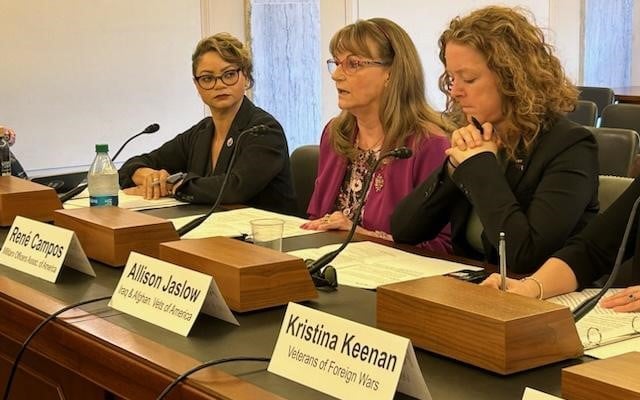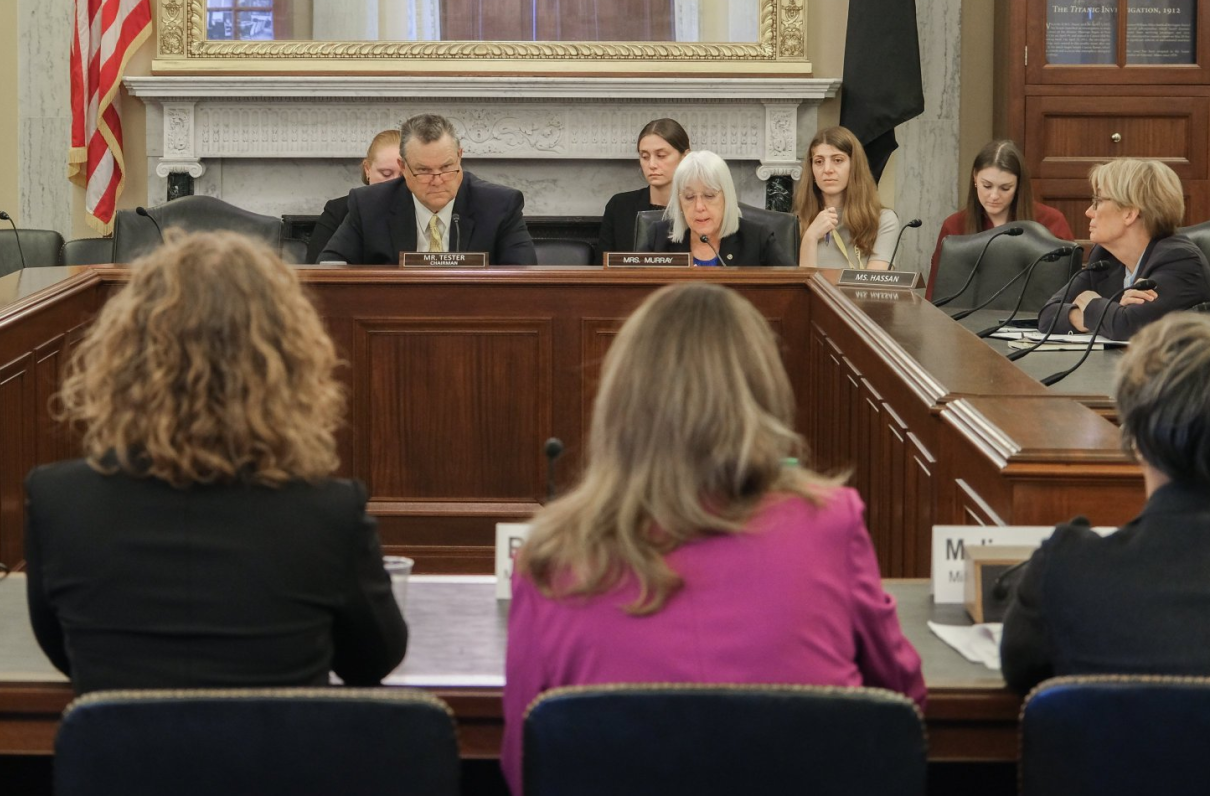MOAA stressed the need for continued, rigorous congressional oversight on behalf of women veterans during a recent roundtable hosted by key Senate leaders – part of a considerable amount of work by Congress in recent weeks addressing the needs of this underserved population.
In April, the Senate Veterans’ Affairs Committee heard testimony from the Veterans Health Administration, Veterans Benefits Administration, the VA’s Office of Inspector General (VA OIG), and veterans service organization (VSOs) on the topic. In May, the committee held an informal roundtable with MOAA and other VSOs to learn more about the unmet needs for women post-service.
[TAKE ACTION: Urge Your Elected Officials to Support Comprehensive VA Health Care]
Women veterans make up 11% of the U.S. veteran population and represent the fastest-growing segment of veterans. About 17% of the active duty force and 17% of the reserve component are women – all numbers that will grow in the coming years, according to DoD and VA projections.
The Veterans’ Affairs Committees in the House and Senate have worked hard in recent years to ensure equitable care to women veterans through passage and/or introduction of MOAA-supported legislation such as the:
- Deborah Sampson Act: Passed as part of a VA omnibus bill that became law in 2021, this legislation eliminates barriers and improves access to health care, including coverage of costs for newborn emergency transportation; creation of an VA office of women’s health; and establishment of a child care assistance program, homeless veterans assistance, and other gender-specific services.
- Making Advances in Mammography and Medical Options (MAMMO) for Veterans Act: This 2022 legislation provides life-saving screening, treatment, and care for veterans diagnosed with breast cancer when the need has never been more urgent, given the significantly higher risk of breast cancer and other cancers in the military population.
- Servicemembers and Veterans Empowerment and Support (SAVES) Act: Introduced in this Congress, the bill would expandhealth care and benefits for survivors of military sexual trauma (MST).
[RELATED: Lend Your Support for the MOAA-Backed Bill to Support Military Sexual Trauma Survivors]
While VA and Congress have done a great deal to spotlight women and other underserved populations (minority, homeless, and rural veterans, for example), hearings, reports, and testimony continue to highlight major gaps in providing services to these groups.
The VA OIG highlighted several such deficiencies during the April hearing, to include a lack of access to women’s primary care providers and gender-specific care in the VA and the community; limited MST support; and how a lack of trust may prevent some women veterans from seeking VA services. Women veterans from the Disabled American Veterans, the Paralyzed Veterans of America, the Wounded Warrior Project, and an advocate from Senate Veterans’ Affairs Committee Chairman Sen. Jon Tester’s home state of Montana lent credence to the VA OIG’s claims at the hearing.

Cmdr. René Campos, USN (Ret), MOAA's senior director of Government Relations, center, speaks during a roundtable hosted by Senate Veterans' Affairs Committee leadership last month. (Photo courtesy of Julie Howell/Paralyzed Veterans of America)
MOAA’s Priorities
Similar issues rang true at a follow-on roundtable hosted by the chair and Sen. Patty Murray (D-Wash.), a staunch supporter of women veterans, where MOAA, the Minority Veterans of America, the Iraq and Afghanistan Veterans of America, the Service Women’s Action Network, and the Veterans of Foreign Wars provided more insight on the challenges facing women veterans.
MOAA focused its remarks generally on the need for more rigorous congressional oversight and hearings on the implementation of current legislation like the Deborah Sampson and MAMMO Acts to hold VA accountable and, more specifically, on:
- Eliminating disparities to ensure equitable delivery of health care and benefit services by passing the SAVES Act. This legislation will help improve women’s access to health care and benefits, delivering it in a respectful, sensitive, and timely manner that honors their service and recognizes their sacrifices.
- Ensuring life-cycle health care for servicewomen and women veterans by adopting a whole health approach that incorporates research, oversight, legislation, policy, and programs to better understand and inform our nation’s support to women who serve, from service entry and throughout life.
- Seeking a congressional focus on women, minority, and other underserved veteran populations by establishing a task force, a subcommittee, or conducting ongoing roundtables to root out problems and targeting solutions that interlink and affect populations VA and DoD serve.
MOAA is also grateful to the HVAC, SVAC, House Armed Services, and House Military Construction-VA Appropriations Committees for introducing legislation to support servicewomen and women veterans. We are pleased to see a provision to study the feasibility of establishing one or more Centers of Excellence for Servicewomen’s Health and the requirement for a congressional brief on DoD’s research efforts related to women’s health introduced in the House version of the FY 2025 National Defense Authorization Act (NDAA).
House appropriators are also responding by introducing legislation to ensure sufficient funding for prosthetics designed specifically for women veterans, more attention to prosthetic and toxic exposure research, fertility counseling and treatment using assisted reproductive technology to cover veterans or their spouses or for adoption reimbursement, and funding for gender-specific care.
There is still much more to be done to move the NDAA, VA appropriations, and other important legislation like the Senator Elizabeth Dole 21st Century Veterans Health Care and Benefits Improvement Act over the finish line to become law. Stay updated on these bills and what you can do to help MOAA improve women’s health care and benefit services and the lives our entire veteran community.
When MOAA Speaks, Congress Listens
Learn more about MOAA’s key advocacy issues, and contact your elected officials using our messaging platform.

